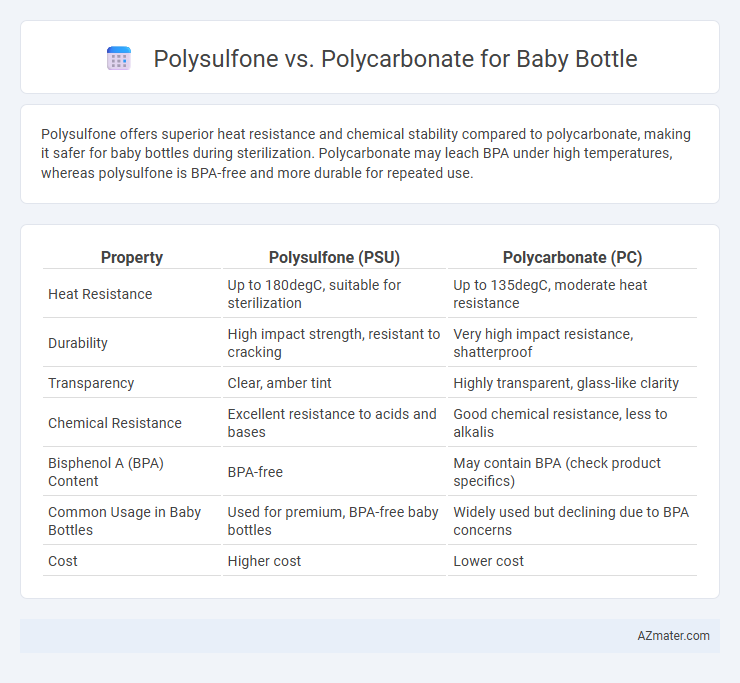Polysulfone offers superior heat resistance and chemical stability compared to polycarbonate, making it safer for baby bottles during sterilization. Polycarbonate may leach BPA under high temperatures, whereas polysulfone is BPA-free and more durable for repeated use.
Table of Comparison
| Property | Polysulfone (PSU) | Polycarbonate (PC) |
|---|---|---|
| Heat Resistance | Up to 180degC, suitable for sterilization | Up to 135degC, moderate heat resistance |
| Durability | High impact strength, resistant to cracking | Very high impact resistance, shatterproof |
| Transparency | Clear, amber tint | Highly transparent, glass-like clarity |
| Chemical Resistance | Excellent resistance to acids and bases | Good chemical resistance, less to alkalis |
| Bisphenol A (BPA) Content | BPA-free | May contain BPA (check product specifics) |
| Common Usage in Baby Bottles | Used for premium, BPA-free baby bottles | Widely used but declining due to BPA concerns |
| Cost | Higher cost | Lower cost |
Introduction to Baby Bottle Materials
Polysulfone and polycarbonate are two popular materials used in baby bottles, each offering unique benefits for safety and durability. Polysulfone is known for its excellent thermal stability and resistance to chemicals, making it ideal for repeated sterilization without degrading. Polycarbonate provides high impact resistance and transparency but may raise concerns due to potential BPA content, prompting some parents to prefer BPA-free polysulfone alternatives.
What is Polysulfone?
Polysulfone is a high-performance thermoplastic known for its excellent heat resistance, durability, and chemical stability, making it a safe and reliable material for baby bottles. Unlike polycarbonate, polysulfone does not contain bisphenol A (BPA), eliminating concerns about hormone disruption and toxicity. Its transparency and ability to withstand repeated sterilization processes ensure long-lasting use while maintaining safety for infants.
What is Polycarbonate?
Polycarbonate is a durable, transparent thermoplastic commonly used in baby bottles due to its high impact resistance and clarity. It offers excellent heat resistance and maintains structural integrity during repeated sterilization cycles, making it a practical choice for baby products. However, concerns about bisphenol A (BPA) in certain polycarbonate formulations have led manufacturers to explore BPA-free alternatives like polysulfone.
Chemical Composition and Structure Comparison
Polysulfone features a high-performance aromatic polymer structure characterized by sulfone groups (-SO2-) linking aromatic rings, providing excellent thermal stability and chemical resistance essential for baby bottles. Polycarbonate consists of carbonate groups (-O-(C=O)-O-) connecting bisphenol A units, offering high impact resistance and transparency but raising concerns due to potential BPA release. The rigid aromatic backbone in polysulfone contributes to superior durability and chemical inertness compared to the slightly more flexible and BPA-containing polycarbonate structure.
Safety and Health Considerations
Polysulfone offers excellent thermal stability and chemical resistance, making it a safer choice for baby bottles by reducing the risk of leaching harmful substances like BPA, commonly found in some polycarbonate variants. Polycarbonate, while durable and impact-resistant, has raised health concerns due to potential BPA migration, especially when exposed to heat or prolonged use. Prioritizing polysulfone in baby bottles minimizes exposure to endocrine disruptors, ensuring better safety and health for infants.
Durability and Heat Resistance
Polysulfone offers superior durability and exceptional heat resistance, maintaining structural integrity at temperatures up to 170degC, making it ideal for repeated sterilization of baby bottles. Polycarbonate, while durable and impact-resistant, has a lower heat tolerance around 135degC and can degrade more quickly under high-temperature sterilization. Polysulfone's resistance to discoloration and chemical breakdown ensures longer-lasting and safer baby bottles compared to polycarbonate options.
Transparency and Aesthetic Appeal
Polysulfone offers excellent transparency with a glass-like clarity, maintaining visual appeal while providing high heat resistance and durability for baby bottles. Polycarbonate also delivers exceptional clarity and a smooth, glossy finish but carries concerns regarding BPA content, which may affect consumer preference despite its aesthetic advantages. Both materials provide superior transparency, yet polysulfone's chemical stability and BPA-free nature make it a safer choice without compromising the baby bottle's visual attractiveness.
Ease of Cleaning and Maintenance
Polysulfone baby bottles offer superior ease of cleaning due to their high chemical resistance and ability to withstand repeated sterilization without degradation. Polycarbonate bottles, while durable, may develop scratches over time that can harbor bacteria, making maintenance more challenging. Selecting polysulfone ensures longer-lasting clarity and hygienic integrity through frequent cleaning cycles.
Environmental Impact and Recyclability
Polysulfone baby bottles exhibit superior thermal stability and chemical resistance with a lower environmental footprint due to their longer lifecycle and resistance to degradation, but they are less commonly recycled because specialized facilities are required. Polycarbonate bottles, while more widely recyclable and easier to process in standard recycling streams, raise environmental concerns due to potential bisphenol A (BPA) leaching during degradation and production involving higher carbon emissions. Choosing polysulfone can lead to decreased plastic waste accumulation despite recyclability challenges, whereas polycarbonate offers better immediacy in recycling infrastructure but poses greater long-term ecological risks.
Final Verdict: Which Material is Better for Baby Bottles?
Polysulfone offers superior heat resistance and chemical stability, making it highly durable and safe for repeated sterilization of baby bottles. Polycarbonate provides excellent clarity and impact resistance but raises concerns due to potential BPA content unless explicitly BPA-free certified. For baby bottles, polysulfone is generally the better choice given its safer chemical profile and long-term performance in sterilization conditions.

Infographic: Polysulfone vs Polycarbonate for Baby bottle
 azmater.com
azmater.com